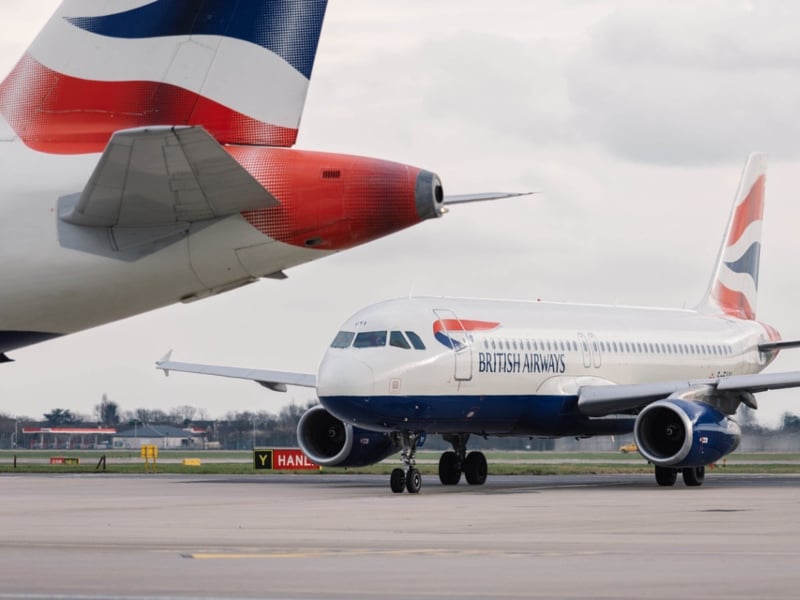UK Air Passenger Duty: How to Avoid Paying Hundreds

If you’ve ever booked a flight that departs the UK, you may have noticed that there’s a rather hefty departure tax that you need to pay on both commercial and award bookings. This is called the UK Air Passenger Duty (APD) and it’s included in the airfare paid to the airline.
Following the most recent tax increase on 1 April 2025, the UK APD now adds up to £224 (~AU$470) to the cost of your ticket!
The exact rate depends on the distance you’re travelling from the UK and your class of travel. The rates for short-haul international flights are £13 (~AU$27) per Economy passenger and £28 (~AU$59) for passengers in any higher class of travel (i.e. Premium Economy, Business or First Class). There is also a much higher rate that applies to private jets, although a discounted rate is charged on domestic flights.
Luckily there are a few ways to avoid paying the expensive Air Passenger Duty.
About the Air Passenger Duty
The UK Air Passenger Duty was first introduced in 1994. The UK government claims that the tax is designed to reduce the impact of aviation on the environment. Critics say that the tax is merely revenue raising, noting that it does not account for the efficiency of the aircraft and that proceeds from the tax do not actually contribute to environmental projects.
Each year on the first of April, the UK government increases the Air Passenger Duty rates. (And no, unfortunately this isn’t an April Fools joke.)
APD destination bands
The amount payable depends on the route that you’re flying from the UK. There are four destination bands for this:
- Domestic
- Band A (short-haul flights)
- Band B (medium to long-haul flights)
- Band C (ultra long-haul flights)
Band A (short-haul) flights are defined as travel from the UK to a country whose capital city is less than 2,000 miles from London. This includes travel to all countries in Europe, as well as northern Africa, Turkey, Greenland and western Russia.
Band B destinations are countries whose capital city is between 2,000 and 5,500 miles from London. This includes countries such as the United States, Canada, UAE, Qatar, China, India and Egypt.
Band C destinations are countries with a capital city more than 5,500 miles away from London, including South Africa, Japan, Singapore and (obviously) Australia.

Current Air Passenger Duty rates
Here is a summary of the Air Passenger Duty rates as of 1 April 2025:
| Route | Economy | Premium cabins |
|---|---|---|
| UK Domestic | £7 | £14 |
| Band A (short-haul) | £13 | £28 |
| Band B (medium to long-haul) | £90 | £216 |
| Band C (ultra long-haul) | £94 | £224 |
For example, the tax on a one-way Economy Class flight from London to Perth is £94 (~AU$199).
How to avoid paying the UK Air Passenger Duty
The UK Air Passenger Duty can quickly add up to hundreds or even thousands of dollars, especially if you’re travelling as a family. So, how can you avoid paying this tax?
Firstly, the tax only applies to international flights departing the United Kingdom. There is no charge to arrive in the UK. So, if you’d like to include a visit to the UK on your European holiday, you should consider starting rather than ending there. Returning to Australia from outside of the UK will ensure you don’t pay hundreds of dollars in unnecessary taxes.
Even if you’re planning to visit only the UK, the cost of a Eurostar ticket to Paris or Brussels is often lower than the Air Passenger Duty for a long-haul flight!

If you specifically wish to take a flight that departs the UK, there is a loophole. Passengers that are in transit in the UK for less than 24 hours do not need to pay the Air Passenger Duty. For example, you could fly from Paris to London, spend a night in London, and then fly out of London the next day. You won’t pay the Air Passenger Duty as long as your layover is under 24 hours and you’re travelling on a single ticket.
There is an exemption for children under the age of 16 that are flying in Economy, who do not need to pay this tax. This exemption does not apply to children flying in a premium cabin.
Another exemption applies to long-haul flights departing Northern Ireland. Flights departing from Jersey or Inverness are exempt from the APD as well.
The Scottish government had previously proposed to replace the Air Passenger Duty applicable to flights departing Scotland with a lower “Air Departure Tax”, but progress on this has stalled.



Community Comments
Loading new replies...
Join the full discussion at the Australian Frequent Flyer →